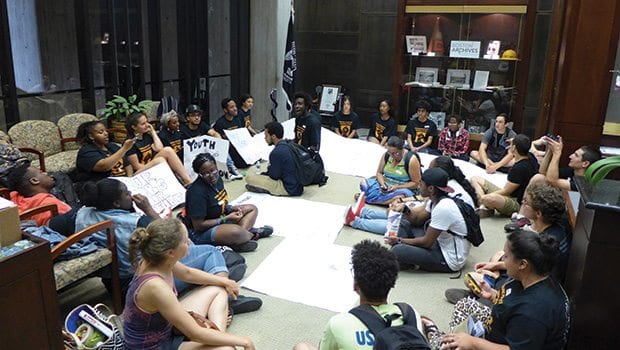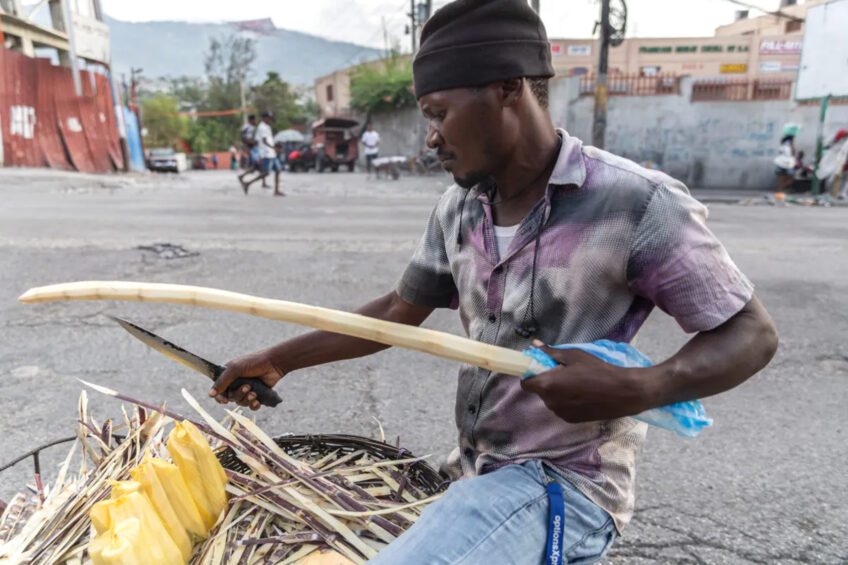
Youth organizers advocating for more city-funded youth jobs staged their second protest in about a month in the Mayor’s office last week, temporarily crowding his front office.
“The mayor put in $270,000 for 200 youth jobs and that’s lower than what we were asking,” said Peaches Perez, an organizer with the group Youth Justice and Power Union, explaining the reason for their continued protest on June 23.
Mayor Walsh announced the youth jobs increase last week while attending the U.S. Conference of Mayors in San Francisco. In an email statement to the Banner following the protest, mayoral spokesperson Bonnie McGilpin pointed to those investments and emphasized the mayor’s commitment to the issue.
“Under his leadership, in 2014 the Mayor’s Summer Jobs Program through public and private partnerships provided over 10,000 jobs and the mayor has been working everyday to reach that same goal,” she said.
The organizers, however, said that they were frustrated with what they said was a minor increase in jobs that would not satisfy the need. They claim that the city needs at least 14,000 job slots to match the number of young people looking for work.
The group settled on the 14,000 number, which they called a conservative estimate, through a variety of calculations they shared with the Banner. One calculation argues that if the age limits for SuccessLink applicants were expanded to include 14- and 19- year olds and they applied in the same ratio as the current 15-18 age group, the total number of SuccessLink applicants would be about 13,500.
Another calculation pointed to Center of Labor Market Studies data that claimed about 60 percent of Massachusetts teens want to work – which would translate to at least 21,000 young people in Boston.
The city’s youth jobs are funded through a mix of city, state and private funding, with the majority of funding coming from municipal coffers.
The protest in the mayor’s office was the second such sit-in staged by the group in a matter of weeks. The previous sit-in, held on May 20 and also covered by the Banner, was silent, lasted for just five minutes, and included fewer people. This time around, the group was higher in number – approximately 40 young people in all – and made a point to be loud and stay longer.
This time, the group sat in the mayor’s office for about 40 minutes, chanting phrases such as “The youth united will never be defeated!” and “If we don’t get it, shut it down!”
This protest brought the chief of security for City Hall, Sgt. Daniel Keeler, to the room to address the group’s noise level.
The group of young people stressed that the point of their protest was to be disruptive to business-as-usual, and erupted into chants and singing. An increasingly frustrated Keeler responded by recording a video of the group with his phone, although it was not clear for what purpose.
The group did agree to leave by the end of the business day, and were on their way out the door by about 4:55 PM.
The Banner checked with Keeler about whether it was an issue of fire safety, but he said it was not.
“It’s disruptive, you can hear it through the building,” he said.
When asked for comment on the protest itself, McGilpin responded, “City Hall is open to all, and residents are welcome to express their opinions within City Hall. ”
A personal matter
For many of the youth organizers, the matter of youth jobs was personal. Organizer Douana Offie said that work was a way for her to support her family.
“Watching my mom suffer as a single mom was hard,” said the 17-year-old from Dorchester. “When I got my first job at age 14 as a camp counseler, I gave my first paycheck to her so she could pay bills and buy groceries.”
For Ziquelle Smalls, a 19-year-old organizer with the group, it was personal for a different reason.
“Youth jobs means so much to me, thinking about queer and trans youth who are rejected from jobs who being who they are,” they said, adding that was an issue that they identified with.
Some other mayoral staffers who declined to give their names briefly met with leaders from the group after the protest.
Carlos Rios, a 21-year-old with the group, said he thought the mayor’s recent touting of his youth job numbers while at the mayor’s conference in San Francisco was “to basically make his image look good” and said the numbers were not anywhere near what was needed to have a significant impact.
Pushing public dollars
As previously reported in the Banner, an ongoing point of contention between the group and the mayor is the role of the private sector in youth job creation – a point of some contention between the mayor and the youth organizers.
McGilpin stressed the importance of private partnerships in her email to the Banner.
“While local government is a leader in these efforts, the private sector also plays a major role in providing young people with meaningful employment experiences, and a productive, safe working environment,” she said. “The mayor appreciates the commitment of the city’s private sector partners, and will continue to engage with new and existing companies to cultivate young talent in the city.”
Walsh’s call for greater private sector involvement in youth job creation is ongoing. In his statement on the matter last week, he called for interested parties to contact the city at summerjobs@boston.gov.
Youth organizers argue that private sector investment in youth jobs, while beneficial, does not have a large enough impact on the overall issue.
In a statement to the Banner, the group called the mayor’s securing of private sector jobs “an important step,” but said that such companies added fewer than 100 jobs per year.
“It is important that Mayor Walsh pressure companies, but the number of jobs that results is small compared to the press coverage that he gets for his efforts,” the statement reads.
“Private job placements and state funding will not add 4,000 jobs to allow 14,000 youth to work,” the statement said, stressing again their desire for greater city funding.
Ongoing issue
The conversation on the matter is ongoing. The YJPU group met with the mayor last week. Youth organizers expressed some frustration about that meeting.
“In our meeting, Mayor Walsh said he doesn’t want to take from one area, like the $324 million for police, and put money into another area, like youth jobs,” the group said in a statement. “Mayor Walsh talked about how his priority is violence, but it’s funny to focus on violence and not all the causes of violence.”
However, they said they were “tentatively hopeful about the future,” as long as the Mayor continued to meet with them.
McGilpin added a similar nod to the future.
“The mayor met with the group just last week, and looks forward to working with them in the future in order to discuss additional ways to secure summer jobs for youth,” she said in an email to the Banner.






